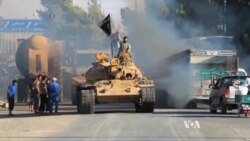U.S. President Barack Obama has ruled out sending ground troops to Iraq to fight militants of the so-called Islamic State or ISIS, despite officials in Washington describing the extremist group as the biggest threat the United States has faced in years. There is growing uncertainty over whether the West’s response to ISIS will be enough to defeat the terrorist threat.
In just two years, the self-described Islamic State group has gone from being a loose coalition of Islamist rebel groups to a formidable fighting force that controls swaths of Syria and Iraq.
America’s response so far has been limited airstrikes launched from an aircraft carrier in the Persian Gulf. It will not be enough to defeat the terrorists, says Thomas Hegghammer, director of terrorism research at the Norwegian Defense Research Establishment in Oslo.
“Airstrikes alone are not sufficient. They might just stir the hornet’s nest," said Hegghammer.
Speaking Tuesday, U.S. President Barack Obama again ruled out putting American troops on the ground in Iraq.
“We’ll not allow the United States to be dragged back into another ground war in Iraq. Because ultimately it is up to Iraqis to bridge their differences and secure themselves," he said.
There is an element of gamesmanship in the diplomatic strategy between the West and Iraq, says Hegghammer.
“The tendency [is] for local countries to wait for a big country like the U.S. to step in and foot the bill in terms of money and human costs. The challenge is to avoid that, to get the local actors more involved to take more of the cost," he said.
The current inaction is strengthening ISIS, says Shiraz Maher of the International Center for the Study of Radicalization at Kings College London.
“At the moment there is absolutely no momentum or appetite to put boots on the ground in Syria or Iraq. And without that unfortunately, it looks impossible to challenge ISIS," he said. "The Syrian and Iraqi armies aren’t capable of doing it, no Arab force is going to do it even if it has the capability to do so, and that’s what makes ISIS such a potent threat."
Recent actions by ISIS - including the slaughter of Christian and Yazidi minorities and the beheading of U.S. journalist James Foley - appear to be designed to provoke the West, says Hegghammer.
“ISIS might want a medium-sized Western intervention in Iraq, one that’s big enough to give ISIS political credibility and help them with recruitment, but one that’s not large enough to dent them seriously, in military terms," he said.
On the ground in northern Iraq, Kurdish forces have been on the front lines fighting ISIS. Several Western countries have offered them arms. That will give them the capability to take on ISIS, says the Kurdistan Regional Government Representative in London, Bayan Sami Abdul Rahman.
“We’re not calling for boots on the ground. We have our own boots: we have the Peshmerga," she said. "But we are calling for more assistance, particularly more airstrikes, weapons for the Peshmerga, logistical support and sharing of intelligence."
Whether such Western support will lead to the defeat of the Islamic State remains uncertain. But the United States and its allies are resolute that ground troops will not be returning to the deserts of Iraq anytime soon.





